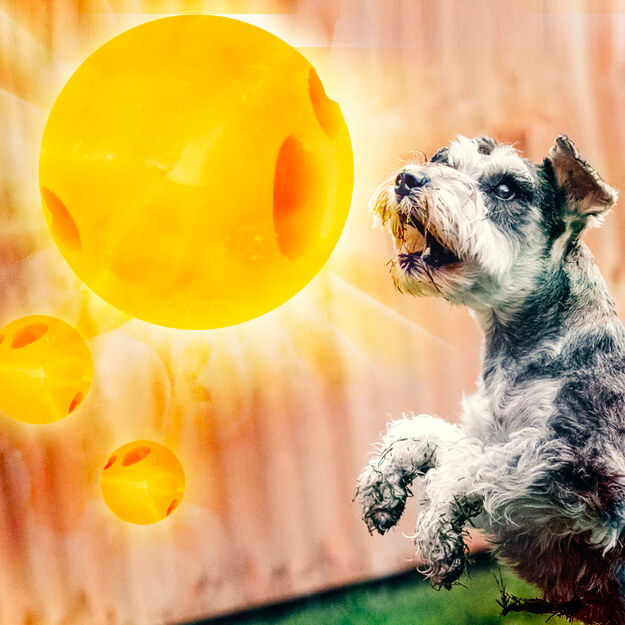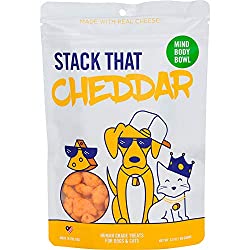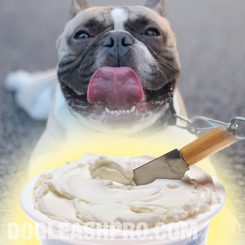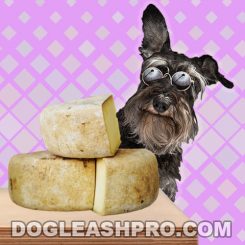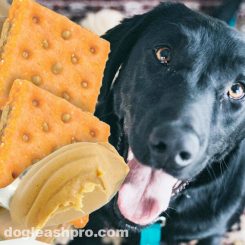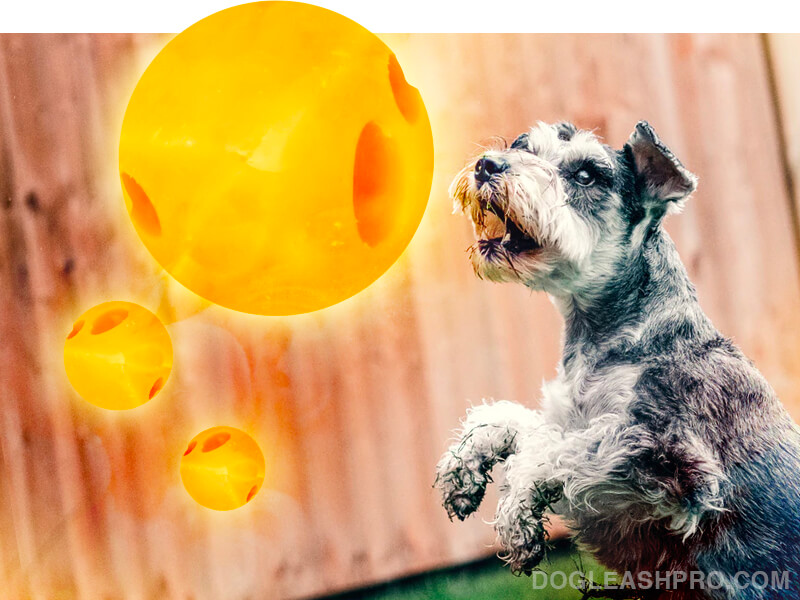
Yes, dogs can eat Cheese Balls in moderation; however, many pet owners are still reluctant to give them these treats because they believe that dogs should not eat processed cheese snacks like Cheese puffs and Cheese Balls. Cheese Balls also contain high levels of fat and sodium.
In reality, dogs can have an occasional processed snack as long as it is less than 10% of their diet. The average percentage for most other treats ranges from 20% to 30%. Remember moderation is key here. Don’t make processed foods or cheese products a staple in your dog’s diet and definitely not as a regular treat.
If you have a dog, then you may find yourself in the dilemma of whether or not to feed your pup Cheese Balls or Cheese puffs. After all, they’re just harmless little snacks and it’s hard to resist those puppy eyes begging for something more exciting than their dry kibble. But is it really safe? Let’s explore further.
Table of Contents
Can Dogs Eat Cheese Balls?
It really depends on the type of Cheese Ball you are going to be feeding your dog. If you are feeding them natural Cheese Balls (actual cheese in the shape of a ball) then you should be careful as most dogs are lactose intolerant, meaning they can’t digest dairy products properly.
Natural Cheese Balls should be ok in moderation, especially if your furry friends can tolerate dairy products such as sour cream, milk, and ice cream.
Also, keep an eye on the amount of sodium present in the Cheese Balls and limit the amount you feed your dog accordingly. Cheese products are often processed foods with preservatives so they have a lot of sodium. This can lead to kidney problems and urinary tract infections in dogs. Consuming too much salt can also lead to sodium poisoning.
In addition, the sugar content present in most Cheese Balls can cause dental decay and obesity for your pup. If you must feed your dog natural Cheese Balls, it’s important to monitor how much they eat. If you notice any health issues in your canine friends after they eat the Cheese Balls, make sure to stop feeding them immediately and call your vet right away.
UTZ Cheese Balls
When it comes to Cheese Balls, you’re also probably thinking about your favorite childhood snack, the UTZ Cheese Balls that come in a 23oz, 28oz, 32oz, or 35oz can.
You can find one of these cans in your local grocery store or supermarket. They are crunchy, mouth-sized, and packed with that cheesy taste!
Let’s take a look at the list of ingredients in these UTZ Cheese Balls and see if they are safe for doggy consumption:
UTZ Cheese Balls ingredients
- Corn Meal.
- Vegetable Oil: Cottonseed Oil, Corn Oil, Sunflower Oil, or Canola Oil.
- Whey.
- Maltodextrin.
- Cheese: Semisoft and Cheddar (Pasteurized Milk, Cheese Culture, Salt, Enzymes).
- Milkfat.
- Salt.
- Whey Protein Concentrate.
- Buttermilk Solids.
- Natural Flavor.
- Sodium Phosphate.
- Lactic Acid.
- Yellow #6.
- Autolyzed Yeast Extract.
- Yellow #5.
- Disodium Guanylate.
- Artificial Flavor.
When it comes to your dog’s food, a good rule of thumb is to look through the ingredients, and if you don’t know what it is or you can’t pronounce it, it’s usually food or snack that you should skip and avoid feeding your canine friends.
Corn meal is not healthy for dogs
The Cheese Balls are made predominantly with corn. Cheese is then added to the Cheese Balls to give it the Cheese flavor. Unfortunately, cornmeal is not healthy for dogs.
In fact, dogs do not need corn. Our furry friends actually have a hard time digesting food with corn products. Some dog foods do include cornmeal as one of the ingredients, but not for any good reason. The cornmeal is also used as a filler and does not provide any nutritional benefit to our pooch.
It is very likely that the cornmeal used to make Cheese Balls are made from mass-produced corn that is of poor quality.
Vegetable oils used aren’t the healthiest for dogs
The UTZ Cheese Balls uses the following types of vegetable oils: Cottonseed Oil, Corn Oil, Sunflower Oil, or Canola Oil. The only type of oil in this list that is healthy and best for dogs is the sunflower oil. While other vegetable oils on this list aren’t toxic or harmful to dogs, they’re not the most healthy oil type for our pooch.
The most healthy oils for our furry friends are the following:
- Coconut oil.
- Fish oil.
- Olive oil.
- Flaxseed oil.
- Sunflower oil.
These healthy oils contain natural fat and can help keep your dog’s skin and coat moisturized, shiny, and smooth.
Salt in excess amount is harmful to dogs
There is 300mg of salt in a 35oz jar of Cheese Balls. If you’re not careful or your furry friends get into the jar of Cheese Balls, they may put themselves at risk for salt poisoning. Keep in mind that a 33 pound dog should only have less than 100mg of salt each day. A 35oz jar of Cheese Balls would therefore be 3 times more salt content than you dog needs.
If your furry pals accidentally ate a lot of the Cheese Balls, be sure to provide a fresh bowl of cool water for them to keep them hydrated. Eating a lot of Cheese Balls in a short period of time can cause sodium-ion poisoning and not having any water nearby can be detrimental to your dog’s health.
Stay alert and observe your pups carefully if they ate a lot of the Cheese Balls. Signs and symptoms of salt toxicity includes:
- Swollen tongue.
- Very thirsty leading to frequent urination.
- Feeling nauseous and vomiting as a result.
- Watery diarrhea.
- Feeling lethargic or tired.
- Fainting.
- Not wanting to eat or loss of appetite.
- Stomach pain or upset stomach.
- Muscle spasm or tremor.
- Feeling dizzy, confused, or have a headache.
- Having respiratory distress or having difficulty breathing.
- Fast heartbeat.
- Kidney failure or damage.
- Large amount of fluid buildup inside the dog’s body.
Handy Hint: You can determine why your dog threw up just by looking at the texture and color of their vomit. Be sure to check out our Dog Vomit Color Guide to confirm your finding.
Can Dogs Eat Cheese Puffs?
Dogs have a wide range of taste buds, making them able to digest some foods that other animals can’t. Some breeds such as bloodhounds and basset hounds are even considered “super tasters” with an especially heightened sense of smell and taste.
Despite their varied tastes, not all human food is safe for dogs. Cheetos or Cheese puffs aren’t going to be a problem because they probably don’t contain enough salt to cause serious health problems, but Cheese Balls will probably upset their stomach due to the highly processed nature of the snack.
Your dog may experience symptoms like vomiting, diarrhea, depression, tremors, high temperature, and even seizures if overfed processed foods high in sodium so practice moderation.
So, can dogs eat Cheese Balls?
So, can dogs eat Cheese Balls? The answer is yes they can. They can also eat cheese cubes, cottage cheese, sour cream, and shredded mozzarella. A dog’s diet is not the same as a human’s because they are unable to digest dairy the same way humans do. Try to avoid processed cheese snacks if possible and if you must feed them to your dog keep it to a minimum.
Ingesting too much cheese can lead to stomach upset and an upset stomach can make for a miserable day for your dog. Remember that all dogs are different, some may be able to eat more than others without issue but there is no harm in being cautious just in case. Try to stick to an all-natural diet if possible, one that contains a balance of nutrients vital such as green veggies and meats which are great for your dog’s health.
As always, it’s best to consult with your veterinarian before feeding any new food item to your dog so they can advise you on the best foods for them.
Common Questions
Dogs have issues with cheese and processed foods even those designed for babies. Giving them too much or even a little of these processed Cheese puffs could cause them some stomach issues. Look for snacks not loaded with processed ingredients, cheese, and sodium or stick to feeding your dog food designed for them.
Just because they are baked doesn’t make baked cheetos any healthier than their fried counterparts. These snacks are loaded with processed artificial ingredients and sodium and best kept away from your dog. If you must share cheetos with your furry pal do so in moderation.
Crunchy, standard, baked, it really doesn’t matter how you classify it these snacks are still junk food. Avoid giving your dog crunchy cheetos regularly if at all.
Mini Cheetos are just as unhealthy as their full sized counterparts. The only saving grace here is that they are smaller and pack less of a health punch due to this. Avoid giving your dog mini cheetos often, once in a while it should be ok.
Keep an eye on your dog to see how they handle processed foods, not all dogs react the same way to foods. Contact your veterinarian if you are concerned about your dogs reaction.
It’s ok to feed your dog organic Cheetos in moderation, but don’t make it an everyday thing. Be strong and avoid the urge to give your dog too much unhealthy processed food no matter how much they beg and give you puppy dog eyes.
Just like with any other processed snack keep consumption to a minimum. Keep an eye on the sodium content and just be aware that too much sodium could harm your dog. A balanced organic diet is best for dogs, cheddar Cheetos definitely don’t fit into organic.
Can dogs eat hot Cheetos food? It is a common question that people ask when thinking about feeding their dot hot Cheetos. Please don’t feed your dog hot Cheetos. In general, if your dog eats healthy food and gets plenty of exercise then there’s no reason they can’t enjoy something like mild buffalo wings with you at the bar.
However, it is important to note that when we say “HOT” we are not referring to mild spices such as pepper or oregano but rather things like hot sauce, wasabi, habanero peppers or cayenne pepper which can seriously upset your dogs stomach. You should avoid feeding your dog anything with the word “HOT” associated with it, especially Cheetos.
DISCLAIMER: THIS WEBSITE DOES NOT PROVIDE MEDICAL ADVICE
The information, including but not limited to, text, graphics, images and other material contained on this website are for informational purposes only. No material on this site is intended to be a substitute for professional veterinary advice, diagnosis, or treatment. Always seek the advice of your veterinarian or other qualified health care provider with any questions you may have regarding dietary needs.
Resources:
https://en.wikipedia.org/wiki/Dog_food
https://www.akc.org/expert-advice/nutrition/can-dogs-drink-milk/

With over five years of specialized experience as an animal writer, my expertise lies in dog nutrition, health, behavior, grooming, and training. I am dedicated to delivering helpful and informative content that caters to the well-being of our furry friends. My primary goal is to empower pet owners with knowledge and ensure our canine companions thrive in health and happiness. In my free time, I love volunteering at local dog rescue centers.
